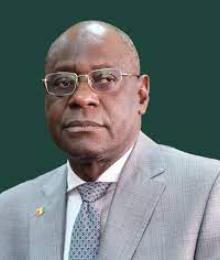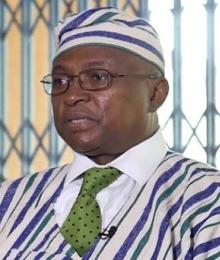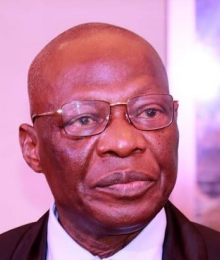
Louncény Nabé is a Guinean economist and central banker who has marked the recent history of his country. Born on March 20, 1955 in Dabola, he advanced academic and professional levels to become Governor of the Central Bank of the Republic of Guinea (BCRG) from December 2010 to 2021. During his tenure as head of the BCRG, he carried out ambitious reforms aimed at stabilizing the economy, fighting galoping inflation, modernizing the banking system and restoring investor confidence.
His major achievements include controlling inflation, creating an interbank exchange market, increasing the number of banks operating in the country, and easing external debt through the PPTE Initiative. Despite a controversial prosecution at the end of his career, Louncény Nabé remains an emblematic figure in Guinea's economic recovery.
Introduction
Louncény Nabé (born 20 March 1955 in Dabola, Guinea) is an economist and central banker who has marked the recent history of his country. Governor of the Central Bank of the Republic of Guinea (BCRG) from December 2010 to 2021, he played a key role in stabilizing the Guinea economy and reforming its banking system. This biography traces his academic, professional and political career, highlighting his major achievements at the head of the BCRG.
Education
Louncény Nabé began his academic career at the Polytechnic Institute of Conakry, where he obtained a degree in administrative sciences in 1980. Wishing to deepen his knowledge in the economic field, he continued his studies at the Ostrava Higher School of Mines, in the Czech Republic, then part of Czechoslovakia. In 1987, he obtained a Ph.D. in Economics.
However, his training did not stop there. In 1991, he studied banking at the Centre for Financial, Economic and Banking Studies of the French Development Agency. (AFD). This training enabled him to acquire solid expertise in the banking sector, which proved to be valuable for his future career.
Professional career
Before joining the Central Bank of the Republic of Guinea (BCRG) in March 1989, Louncény Nabé began his career as a training advisor at the National Centre for Management Development. (CNPG). This experience has enabled him to develop his training and counselling skills.
In 1996, he was appointed National Director of Portfolio and Parapublic Sector Restructuring at the Ministry of Economy and Finance. In this role, he was charged with overseeing portfolio management and restructuring of public enterprises, a crucial task in the context of ongoing economic reforms.
Two years later, in 1998, Louncény Nabé was promoted to the post of Secretary-General of the same department, demonstrating his competence and ability to manage important responsibilities.
Political career
Although his career was mainly focused on the economic and banking fields, Louncény Nabé also had a brief incursion into the political sphere. In September 2008, he was appointed Minister of Mines and Geology, a strategic position given the importance of the mining sector for the Guinean economy.
However, his transition to the government was short-lived, as in December 2010, he was appointed Governor of the Central Bank of the Republic of Guinea (BCRG), a position he held until 2021.
Reforms at BCRG
Since his arrival at the head of BCRG, Louncény Nabé has launched a series of ambitious reforms aimed at recovering the Guinea economy and stabilizing the financial system. Among his main achievements are:
- Fighting inflation: When he took office, inflation in Guinea reached alarming levels, exceeding 20% in 2010. Nabé has put in place measures to close the "liquidity tap" and sanitize the banking system. Thanks to these efforts, inflation was reduced to 12% in 2012.
- Currency stabilization: Louncény Nabé has created a genuine interbank exchange market, allowing for the stabilization of the Guinean franc. This reform has helped restore confidence among investors and international partners.
- Strengthening the banking sector: Under his leadership, the number of banks operating in Guinea has increased from six to fourteen, promoting sound competition and diversification of financial services. In addition, the compulsory reserve ratio was raised from 9.5% to 22%, strengthening the banking system.
- Currency modernization: In order to combat counterfeiting and improve the quality of banknotes in circulation, Louncény Nabé oversaw the progressive withdrawal of the old 10 000-French notes and their replacement with new, better-protected sections.
PPTE
One of Louncény Nabé's major accomplishments as Governor of BCRG was to help Guinea reach the completion point of the Heavily Indebted Poor Countries Initiative (HIPC) on 26 September 2012. Through this crucial step, the country has benefited from an external debt relief of EUR 1.6 billion.
This success was made possible by the efforts of Nabé to restore macroeconomic stability and implement structural reforms, in accordance with the requirements of the PPTE initiative. This debt relief has paved the way for new development prospects for Guinea.
Prosecution
Despite his remarkable achievements, Louncény Nabé was not spared by controversy. After the coup d'état of 5 September 2021, he was prosecuted by the Special Prosecutor's Office of the Court for the Suppression of Economic and Financial Crimes in a case involving 3 tons and 135 kilograms of gold.
On 22 August 2022, after a year in custody, Louncény Nabé was released on bail. The details of this case remain blurred, but she cast a shadow on the last years of her career at the head of the BCRG.
Conclusion
Louncény Nabé's biography testifies to a rich and diverse journey, marked by significant achievements in the economic and banking fields. His transition to the head of the Central Bank of the Republic of Guinea was crucial for the stabilization of the Guinea economy and the modernization of its financial system.
Despite the controversy that struck the end of his career, Louncény Nabé will remain in the annals as one of the architects of Guinea's economic recovery in the early 2010s. His expertise, dedication and determination helped lay the foundations for sustainable growth for the country.
This biography highlights the importance of structural reforms and good governance in the economic development of a country. It also highlights the challenges faced by economic leaders in complex and often controversial situations.






















